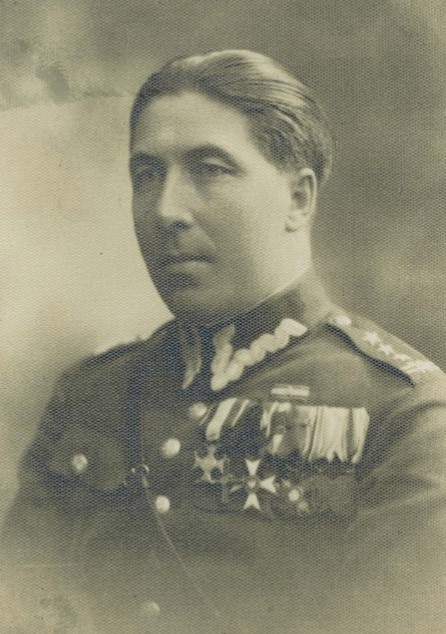Marian Turkowski on:
[Wikipedia]
[Google]
[Amazon]
 Marian Turkowski (1894–1948) was a soldier of
Marian Turkowski (1894–1948) was a soldier of
 Marian Turkowski (1894–1948) was a soldier of
Marian Turkowski (1894–1948) was a soldier of Polish Legions in World War I
The Polish Legions () was a name of the Polish military force (the first active Polish army in generations) established in August 1914 in Galicia (Central Europe), Galicia soon after World War I erupted between the opposing alliances of the Trip ...
and Polish II Corps in Russia
The 2nd Polish Corps in Russia (; ) was a Polish military formation formed in revolutionary Russia in 1917.
History
The Corps was formed at the initiative of the Chief Polish Military Committee (''Naczelny Polski Komitet Wojskowy''), a Polish fac ...
, and officer, later General brygady
A general officer is an officer of high rank in the armies, and in some nations' air and space forces, marines or naval infantry.
In some usages, the term "general officer" refers to a rank above colonel."general, adj. and n.". OED Onlin ...
of the Polish Army
The Land Forces () are the Army, land forces of the Polish Armed Forces. They currently contain some 110,000 active personnel and form many components of the European Union and NATO deployments around the world. Poland's recorded military histor ...
. Altogether, Turkowski served in different military units from 1914 until 1948, with the exception for World War II
World War II or the Second World War (1 September 1939 – 2 September 1945) was a World war, global conflict between two coalitions: the Allies of World War II, Allies and the Axis powers. World War II by country, Nearly all of the wo ...
(1939 - 1945), during which he was kept as a German prisoner of war at Oflag VII-A Murnau
Oflag VII-A Murnau was a German Army prisoner-of-war camp for Polish Army officers during World War II. It was located north of the Bavarian town of Murnau am Staffelsee.
Camp history
The camp was created in September 1939. It consisted of an e ...
.
Turkowski was born on 28 July 1894 in the village of Iwkowa
Iwkowa is a village in Brzesko County, Lesser Poland Voivodeship, in southern Poland. It is the seat of the gmina (administrative district) called Gmina Iwkowa. It lies approximately south of Brzesko and south-east of the regional capital KrakĂ ...
, which at that time belonged to Austrian Galicia. He attended a high school in nearby Bochnia
Bochnia is a town on the river Raba in southern Poland, administrative seat of Bochnia County in Lesser Poland Voivodeship. The town lies approximately halfway between TarnĂłw (east) and the regional capital KrakĂłw (west). Bochnia is most noted ...
, after which studied law at Jagiellonian University in KrakĂłw. In 1914, Turkowski joined Polish Legions Second (then Third) Infantry Regiment. Wounded in the Battle of KostiuchnĂłwka (July 1916), he was captured by the Russians. Released in 1917, Turkowski joined Polish II Corps in Russia. Promoted to lieutenant, he fought in the Battle of KaniĂłw.
In November 1918, Turkowski joined the newly created Polish Army. In January 1919, he served in Białystok Rifle Regiment, which was in October 1921 renamed into 79th Infantry Regiment of Lew Sapieha. He fought in the Polish–Soviet War, and was captured by the Lithuanians.
In the Second Polish Republic, Turkowski commanded the 79th Infantry Regiment (until June 1933), infantry of the 27th Infantry Division (Poland), 27th Infantry Division at Kovel, Kowel (1933 - 1935), lectured at the Center of Infantry Training at Rembertów (1935–1938), and finally commanded 3rd Legions Infantry Division (Poland), 3rd Legions Infantry Division from Zamość (May 1938 - September 1939). In 1938, Turkowski oversaw the destruction of Orthodox churches and prayer houses in the area east of Lublin .
In the Polish September Campaign, his division belonged to Operational Group of General Stanisław Skwarczyński, part of Prusy Army. Wounded in the Battle of Radom (8 September 1939), he was captured by the Germans, and sent to hospital. After release, Turkowski spent the war at Oflag VII-A Murnau
Oflag VII-A Murnau was a German Army prisoner-of-war camp for Polish Army officers during World War II. It was located north of the Bavarian town of Murnau am Staffelsee.
Camp history
The camp was created in September 1939. It consisted of an e ...
in Bavaria.
In mid-1945 Turkowski returned to now-Communist Poland, and reentered the army. In 1946, as commandant of the 7th Infantry Division, he was promoted to General brygady
A general officer is an officer of high rank in the armies, and in some nations' air and space forces, marines or naval infantry.
In some usages, the term "general officer" refers to a rank above colonel."general, adj. and n.". OED Onlin ...
. On 30 September 1948 Turkowski was released from active service, due to health problems. He died on 13 December 1948 in Warsaw, and was buried at the PowÄ…zki Cemetery.
Awards
* Silver Cross of the Virtuti Militari (1922), * Officer Cross of the Polonia Restituta, * Order of the Cross of Grunwald, Third Class, * Cross of Independence (1931), * Gold Cross of Merit (Poland), Cross of Merit * Cross of Valour (Poland).Sources
* Tadeusz Jurga: Obrona Polski 1939. Warszawa: Instytut Wydawniczy PAX, 1990 {{DEFAULTSORT:Turkowski, Marian 1894 births 1948 deaths Polish generals Recipients of the Cross of Independence Recipients of the Silver Cross of the Virtuti Militari Recipients of the Cross of Valour (Poland) Recipients of the Gold Cross of Merit (Poland) Polish people of the Polish–Soviet War